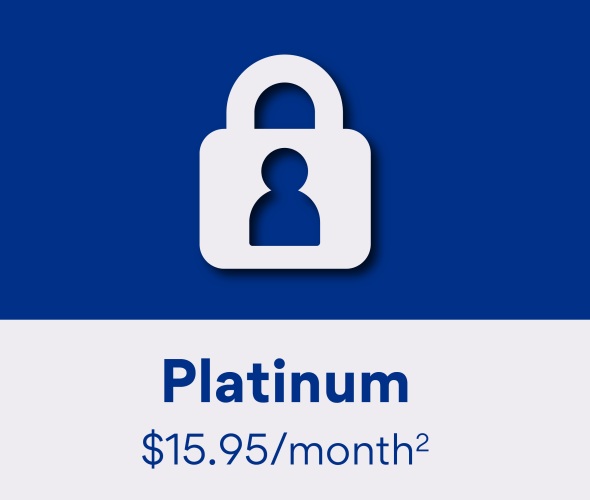If you were previously enrolled in AAA Identity Champion, click here for information about the transition of your account to ProtectMyID.
ProtectMyID is an exclusive benefit through Experian® included with AAA Membership that helps you take greater control of your identity and protect yourself from fraud.
According to the Federal Trade Commission, identity theft routinely tops the list of reported fraud in the U.S., causing millions of victims to spend time and money to undo the damage. When your personal information is stolen, your bank account might be drained, your credit cards could be maxed out, and your credit history possibly damaged.
Learn more about how to protect your identity with this AAA Member benefit.
Activate your ProtectMyID Essential plan included with AAA Membership
If you’re an active AAA Member, you can activate your ProtectMyID Essential plan at no extra charge on the Experian's ProtectMyID website. This service alerts you to potential trouble and offers fraud resolution support.
Identity protection plans
Choose from three levels of protection and enroll on the Experian's ProtectMyID website. (AAA Membership is required in order to enroll in a plan.)



Enroll on Experian's ProtectMyID website
Frequently asked questions: Identity theft
What is identity theft?
Identity theft occurs when someone uses your personal information without your consent to commit fraud or other crimes. Information like your name, date of birth, driver’s license, or Social Security number can be used to steal your identity.
Why should I be concerned about protecting my identity?
About 4 in 10 consumers say their personal information has been stolen, compromised, or misused. Identity protection can help you detect potential fraud early—and take action quickly—with the support of an identity resolution specialist.
What are the warning signs of identity theft?
Be aware of these warning signs indicating that someone might have stolen your personal information:
- You aren’t receiving household bills and other mail.
- You see withdrawals from your bank account that you don’t recognize.
- You notice unfamiliar charges on your credit card statements.
- You are receiving bills for purchases you didn’t make.
- A company you do business with—such as your bank or an online retailer—sends you a notice that a data breach has compromised your personal data.
- When you apply for credit or a loan, your application is denied despite having a strong credit history.
- Your credit score unexpectedly drops.
- Your tax return has been declined, or the IRS tells you that more than one tax return was filed in your name.
- You file a medical claim and your health care provider rejects it because you’ve mysteriously reached your plan’s limit.
How do I minimize the risk of ID theft?
To lower your risk of identity theft:
- Share your personal information as little as possible.
- Create strong passwords.
- Use two-factor authentication when available.
- Only sign on to secure Wi-Fi networks.
- Update your social media settings to “private.”
- Set up credit card and financial alerts.
- Track your credit score.
What should I do if my identity is stolen?
If you become the victim of identity theft, review your credit reports and place a security freeze on them. A credit freeze restricts access to your credit report so other people can’t open a new credit account in your name. You should also report the theft to the Federal Trade Commission.
If you have an identity protection plan that includes restoration services (like ProtectMyID), contact the service provider immediately for step-by-step assistance.
To begin recovering from theft, change your account passwords, make a list of the fraudulent transactions, and contact any creditors and key agencies.
1Identity theft insurance is underwritten by insurance company subsidiaries or affiliates of American International Group, Inc. The description herein is a summary and intended for informational purposes only and does not include all terms, conditions, and exclusions of the policies described. Please refer to the actual policies for terms, conditions, and exclusions of coverage. Coverage may not be available in all jurisdictions. Review the summary of benefits: $10,000 insurance and $1,000,000 insurance.
2Plus sales tax where applicable.
3Child monitoring covers up to 10 children under the age of 18. One-time parent/legal guardian verification is required to receive alert details for children.
All ProtectMyID plans are provided by Experian. You must be 18 years of age or older and a current AAA Member to be eligible to enroll in ProtectMyID. A valid email address and access to the internet is required. Products subject to change or terminate at any time without notice. Certain terms, conditions, and restrictions apply. Please refer to actual policies for terms, conditions, and exclusions of coverage. Coverage may not be available in all jurisdictions.
